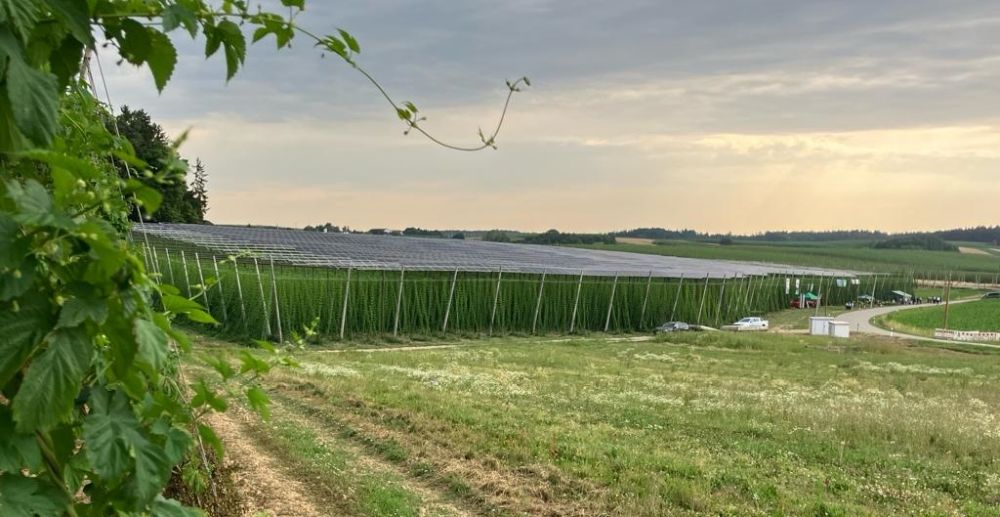| Duration: |
11/2023 - 10/2026 |
| Contracting Authority/ Sponsors: | Federal Ministry of Food and Agriculture (BMEL) |
| Project Partners: | AgrarEnergie GmbH & Co. KG, Hofgut Wimmer, Josef Wimmer, Hochschule Weihenstephan-Triesdorf |
| Website: | Agri-PV |
| Project Focus: |
HoPVen
Increasing the Resilience of Hop Growing to the Consequences of Climate Change: Investigation of the Opportunities and Risks of Agrivoltaic in Conventional Hop Growing
Hops are grown on a large scale in the Hallertau region: Almost a third of the hops produced worldwide are grown on around 17,200 hectares of Hallertau hop gardens. As a crop that remains in the same location for several years, hops are particularly exposed to climatic influences. Dry periods in July and August sometimes led to significant yield losses: in the particularly affected years of 2013, 2015 and 2018, yields were up to 40 % lower, depending on the hop variety. This is where the »HoPVen« project comes in, in which the world's first agrivoltaic system in hop cultivation is being scientifically investigated. The dual use of the land for both agriculture and energy generation through photovoltaics can increase resilience to climate change and diversify the income streams of farms.
In order to increase the resilience of hop cultivation to the consequences of climate change, this research project aims to investigate the opportunities and risks of agrivoltaics in conventional hop cultivation. The focus is on the hop agrivoltaic system completed in July 2023 by farmer Josef Wimmer together with AgrarEnergie GmbH in the Hallertau region, which is being scientifically supported by Fraunhofer ISE and Weihenstephan-Triesdorf University of Applied Sciences as well as the Bavarian State Research Center for Agriculture on a subcontract basis. Here, not only are hop varieties such as »Hallertauer Tradition« and »Herkules« grown on an area of approx. 1.3 hectares, but with an installed capacity of 977 kWp, solar power is also provided for approx. 200 households. The PV modules are mounted on sturdy steel masts at a height of 7 m, which also serve as hop poles. By shading the hop plants with the PV modules, stress caused by the high solar radiation and the need for irrigation can be reduced. In addition, the dual use of agricultural land represents an alternative to the competition for land with renewable energy production and provides an additional source of income for farmers through the sale of electricity into the power grid.
The effects of the agrivoltaic system and the use of different PV modules on air temperature, humidity, light availability, wind speed, wind direction, soil temperature, soil moisture and leaf wetness as well as the resulting changes in the quality and quantity of the hop yield will be investigated. In particular, the use of plant protection products should also be considered. For example, the use of pesticides can result in deposits on the PV modules, which can lead to increased soiling and corrosion. As the effects on efficiency and safety are still largely unknown, various measurements will be used to investigate these effects and develop approaches to reduce possible damage to PV modules and system efficiency losses. In order to ensure the practical suitability of agrivoltaic systems, the project will be acoompanied by economic considerations, including the development of business models. In addition, the impact of the system on the environment and society will be examined as part of a life cycle analysis and acceptance studies.
